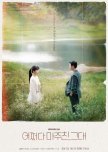
Sophisticated genre mix. Soulful. Well grounded. At a comfortable pace.
With "My Perfect Stranger" KBS has succeeded in creating a sophisticated genre mix: there is a complex crime thriller that is excitingly intertwined across time and space, colored with its ultimately opaque interdependencies. There is charming time-travel with the chance to heal emotionally troubled family relationships and with the distinctive complexion of the late 1980s in the transition from dictatorship to democracy. There is also the pointed coming-of-age of the protagonist's parents and their classmates of that time. At last, even a (though rather tender, cautious) love story emerges out of the common fate of the two time travelers.The KDrama thus is presenting (in my opinion) a thorough emotional variety, which has a lot to offer from suspense to amusement an even romantic vibes. So all of this comes rather casually. Well grounded. At a comfortable pace. With feeling, especially around the diverse family dynamics, which are allowed to take their distinct twists and turns from the different perspectives of time and space.
A coherent, harmonious KDrama experience. Worthwhile.
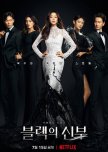
Ready-made. Still worth seeing. Social satire about status & by all means climbing up social ranking
"Remarriage and Desires" tackles a central theme of South Korean social life: who should I, can I, must I or do I want to marry? Marriage, family and status throughout the centuries have been forming a magical triad in this Confucian shaped country - a triad which can decide how happy or unhappy life will become... Yet, these days within the framework of the short-timed everyday life and performance-oriented professional life in modern South Korea there is simply no time for naturally meeting someone and dating. However, the right choice is crucial. So instead of spending time, you spend money and thus can be matched up professionally. This actually has a good tradition in elite circles, where matchmakers were already in high demand during past Joseon days. Arranged marriages - whether devised by shamans, personal matchmakers, professional matchmaking agencies or parents - are widespread today and have recently become trendy even among the less elite classes of society. ... As a good choice can decide everything..."Remarriage and Desires" takes this subject into the grotesque - in a satirical guise with a proper breeze of Makjang. A stately squad of spiteful, greedy contemporaries at the highest ranks are brought together to tell a bitter tale of revenge on revenge on revenge. The bad news first: the Netflix production unfortunately does not get beyond a script that has been polished for the international streaming audience and that also seems to be off the shelf. The good news: KDrama is even good at telling such ready-made stories, too. By the way, it's the intensity of the female leads who are allowed to rock the makjang-show: Bad, worse, the worst... and there still is worse (The men rather become victims and ornaments.)
My criticism: Scheme-F. Ready-made.
The heartbeat get´s lost. The depth is missing. It's not really possible to develop an emotional closeness to the protagonists. Overall, "Remarriage and Desires" thus comes across as somewhat distant and stiff in comparison. As a spectator you will feel less sympathy (from the inside) and instead watch more (from the outside).
You might binge through the (only) 8 episodes pretty quickly. But without the nuances, something is missing. For me at least. I didn´t feel an emotional bonding growing of any sort. Too bad.
However! the KDrama is still worth seeing as a satirical social study about the South Korean middle and upper class (or a general would-like-to-marry-into-the-still-higher-class class).
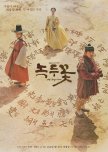
Fight for human rights. A story written with the blood of latest Joseon history. Highly valuable.
Definitely worthwile! "Nokdu Flower" offers a historically remarkable epic with a strong performance. The KDrama excels sort of. It almost seems as if the entire team was all too aware of the ambitious challenge to adequately capturing this short but crucial sequence of Korean history.In the second half of the 19th century, exploitation, famine, a corrupt, incompetent government and weak kings had eroded almost all belief in the existing system, in aristocracy and administration. Then there was the opening of the country to world politics and trades, for which the corrupt Joseon also proved to be profitable. In this historical KDrama it's not so much about the political intrigues around the palace, but about the landowners, administrative offices and Yangban in the provinces as well as the rebellion of the desperate rural people, who simply can't take it anymore.
The struggle for democracy in Korean history, like elsewhere in the world, has been quite bloody. That was last in May 1980 in Gwangju, when the democratic aspirations of the people were brutally crushed by the military. This was so during the student independence movement in 1929 in the fight against Japanese oppression. And that happened in connection with the Donghak movement, too, which had caused quite a stir throughout the country between 1860 and 1894. "Nokdu Flower" is deliberately very close to the front lines of those uprisings for democratic reforms, which then had been for the first time organized on this scale. This forms the perfect background for dramatically intertwined relationship dynamics of two half-brothers, (whose father is one of the particularly exploitative provincial officials who bleed the people dry), as well as the daughter of a merchant, who is used to deal with anybody, even the Japanese, for high profit.
The road to democracy on the Korean Peninsula is definitely rocky. To this day, the reactionary forces are still strong. "Nokdu Flower", however, represents a powerful, unforgettable symbol for the spirited struggle for freedom. The Donghak movement is often seen as the first patriotic Korean movement, since it was also about counteracting the increasing e. g. Japanese influence. But more than a patriotic struggle, initially the Donghak movement was actually about an idea that is bigger than family of origin or nation: It's about basic human rights. (An idea that, not too long before that, had also stirred up the European continent)
Matter follows spirit. And this spirit was shaken up in the rural population of Joseon by a new religious movement: Choe Je-u (1824–1864) created a new faith in 1860: Donghak, which roughly means "Eastern Wisdom". Drawing from Confucianism, Buddhism, Taoism and Shamanism, it sees the divine spirit at work in human beings - in ALL human beings, without distinguishing between class or gender. Additionally, it sees the world as moving in cycles - with a whole new world just waiting ahead.
Nevertheless, it is blood that paves the path to a new era. Eventually, the results of the first Donghak peasant rebellion included a treaty. The "Gabo Reform" recognized the new religion, and among other things, the lowest classes were freed, widows were granted the right to remarry, and penalties for corruption and abuse of office were introduced. Unfortunately, there followed a second peasant rebellion...
This is a story written with the blood of latest Joseon history, sort of.
Overall, a highly valuable production.
--------------- BY THE WAY... ----------------------
...the traditional Korean national dish BIBIMBAP is closely linked to Jeonju and to the Donghak uprising. The heart of the rebellion was in Jeolla province with Joenju being the provincial capital. Among farmers who did not have the time to prepare countless side dishes, it was common to simply mix whatever there was with rice and spices. This food proved its worth, especially when it came to feeding the rebels in their brave fight for new values and a more just future.
... the TITLE TRACK is actually a popular folk song that goes straight back to the peasant uprising. "Nokdu Flower" actually means 'blossom of the mung beans', but here it refers to the nickname of Jeon Bong-jun, leader of the peasant rebellion.
"Bird, bird, blue bird,
bird, bird, blue bird,
Don't sit in the mung bean fields.
When the blossom falls
the farmer goes to cry.
Bird, bird, blue bird,
Jeonju Gobu Nokdu bird,
why don't you fly away
The pines and bamboos are green.
We thought it was summer
yet it's bitterly cold and snowy."
The blue bird refers to the Japanese - they shouldn´t have any business in Joseon and should go away. Joenju and Gobu are legendary places of the uprising. Nokdu refers to Jeon Bong-jun´s nickname and the riot. However, Nokdu, the mung bean, also refers to an important agricultural product and food. Falling blossoms indicate a bad harvest. The 'summer' stands for the first uprising, the 'cold winter' for the second. The song was probably born during the execution of the leader Jeon Bong-jun and has since become a nationwide folk song in several different versions.
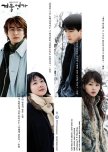
An impressively touching love story. Performed with passion. However, It´s makjang. Be prepared.
The biggest impetus for the KWave came from "Winter Sonata" - this KDrama is almost a blockbuster among KDramas. Its success was enormous. The series sparked its own fan tourism to filming locations on Nami Island, Geojie Island and Chuncheon that continues to this day. The soundtrack also wrote history. In the meantime there is an anime version of the story, a musical production as well as a manga and a Playtstation version...The love story is told in an impressively touching way and performed with passion. In beautiful pictures and with plenty of dramatic twists. The chemistry between the two main actors is perfectly tuned. Bae Yong Joon even shines in two roles at the same time.
However. It is makjang! Twists and turns awaiting around each and every corner. Be prepared for sorrow. You might get angry more than once. The protagonist´s can get on your nerves. For sure. Don´t complain. I told you. It is truely astonishing that still (if you are ready to sympathize to some extent) you will ´enjoy´ the show. ... whereas ´joy´ might not exactly hit the spot... :-)
In case you are not aware (as I wasn´t at first):
Since the story begins in the youth of the main characters, you also get an impression of the Korean lifestyle and everyday life in the late 1980s and 1990s, with true ´democracy´ in South Korea still being in diapers and a conservative, strict, authoritarian aura dominating everyday life. When I saw the series for the first time, I didn´t know much about the political and social conditions. Plus from my German background those morals, values and virtues all seemed old fashioned and in my life rather outdated - it reminded me more of the world of the old black and white movies of the 1930s and 40s: hierarchies and manners, the decisions of the protagonists, the prevailing moral concepts, all of which I - today, far away in Germany - could only shake my head at. Now, as I have learned more about South Korean culture, I know better, where this is coming from... Sympathy and compassion are thus enhanced.
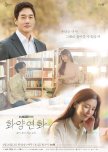
Good stuff. Complex. Powerful at times. Yet you better don´t set the primary focus on the romance.
No idea why the international title is what it is... so beware! If you're expecting a love story here, you'll get one, but certainly not in the way you thought it would. With their motifs and soft focus, the posters for the KDrama also promise more heartbreak of the shallow kind than the story does justice to.
The original title "The most beautiful moment in life - the moment when life becomes a flower" describes the moment in which life (not love) acquires meaning, beauty, direction, form and can blossom. And here we are closer to the topic. The two protagonists have been in love with each other since their student days in the 90s. Yes. But it has grown through their attitude to life, the meaning they give to their own lives, through their principles and quite specifically through the class struggle, the union struggle, the demonstrations for more democracy. By boldly standing up for what they believe in, life is transformed into a (bright, fragrant, inspiring) flower.
To reduce life and its beauty to love would not be enough. But love is definitely part of it - just like water or the sun - to let these flowers (which can/want to be a person's life) grow. This flower reveals its inherent beauty in the creative expression of what is important to you, what you stand for, what you believe in.
In that sense, Yoon Ji-soo's seedling came to life after she met Han Yaeh-hyun during his pro-democracy and workers' rights protests. Ji-soo's enthusiasm for Yaeh-hyun's cause didn't go unnoticed for him either.
-------------- SIDE NOTE: --- Early unionists, political protest and rebellion against injustice ---
We are learning about South Korean democracy movement when it was still in its infancy. During the decades of the dictatorship, conservative politicians skillfully exploited the fear of the communist north and consistently interpreted or pursued any commitment to workers' rights as a communist threat. Strikes and demonstrations were always uncompromisingly dispersed and participants and leaders sentenced to prison terms. Even recently, in the last 5 years, trade unionists, fighting for workers' rights, have been and continue to be arrested for "offences against public order". In the case of convictions of corporate bosses/Jaebeol, a pardon usually follows quickly. Unionists, however, always have to serve their long sentences. Recently, for example, the KCTU chairman Han Sang-gyun was sentenced to three years in prison during an organized mass rally for workers' rights (2016) and Jang Ok-gi from the construction workers' union was imprisoned for a protest march for higher pensions for non-permanent construction workers (2017).
---------------
So the context of this love story is quite serious. And the KDrama cleverly wraps and links this 'seriousness' around the love plot of the two protagonists. The story is told in time leaps between then and now. It tells how Ji-soo's father (head of the district attorney's office) opposes the young love, it tells about Yaeh-hyun's father's unsuccessful struggle for worker´s rights, about Jaebeol Jang Sang, into whose family Yaeh-hyun marries, and about the unscrupulous intrigues of father and daughter, as well as the elite family of lawyers that Ji-soo married into. It tells of the intolerable arrogance of the wealthy towards the lower-income classes, which continues in the form of bullying among their children. It tells of courageous class struggle and rebellion against injustice. It tells of the almost hopeless struggle for one's own rights in the face of powerful opponents. And that it's never too late to let the flower of your life bloom.
So, should you watch it? Yes, it´s good stuff. Complex. Powerful at times. But don´t set the primary focus on the romance. Otherwise you might be a bit disappointed.
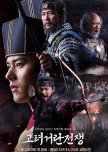
KDrama sure can do historical drama. Goryeo-Khitan War is another prime example of this
"Goryeo Khitan War" is a historical epic intended to honor not only the historically exceptional achievements during the Goryeo-Khitan War, but also half a century of KBS (Korean Broadcasting System). And it does. Perfectly done in all instances and scales. What's even more fascinating is how it succeeds to fill ca. 1,000 years long bygone history with life in a gripping way - close to the facts and colorfully embedded within the midst of the political milieu surrounding the royal court.If I hadn't accidentally stumbled into the filming set in the early summer of 2023, this thoroughly historical KDrama might have slipped a bit back on my list. But this personal connection eventually made me more curious. And now I'm full of praise.
32 hours long history lesson - history can be told so vividly… Complex personalities, an even more complex political context and a highly demanding challenge of war come very close to the audience. You don't have to be of Korean origin to be inspired - by its heart, intelligence, daring, perseverance and humanistic ethos. It is not about simply enumerating historic facts. It is colorful, complex, character driven – what happened about 1.000 years ago comes as close as it gets: Those years around the turn of the millennium at the beginning of the 11th century, when the 8th king of Goryeo - the then still quite young Hyeongjong of Goryeo - had to face the successive invasions of the numerically superior, Khitan of the Liao Dynasty.
What happened way back then obviously has happened a long time ago, but actually many policymakers today could be inspired and encouraged by the political attitude that is being exercised here. Even though facing the acute threat, this canny, courageous, responsible king isn´t willing to simply fly on sight, but rather acts cool-headed and with foresight. He is someone who does not shy away from complex, fundamental, unpopular, but far-reaching, forward-looking structural reforms... And then there is a government official, who not simply and opportunistically cares about himself, but about the cause - about the people, the country and the ´good´ (even if uncomfortable) decision.
The book "Sweet Rain in Winter" by Gil Seung-soo certainly contributed significantly to an excellent script. The historical greats, both large and small, impressively come to life. Romance is secondary, bromance is the theme here. By this I mean less the homosexuality of Mokjong, the 7th king of Goryeo. Rather, the intense struggle and relationship between King Hyeonjong and Gang Gam-chan, a scholar, government official, mentor of the king and crucial military commander during the third Goryeo invasion.
The KDrama offers a distinctively Korean (chapter of hi)story. One with a lot of pathos and even more ethos. One about people and their relationship dynamics, about their character strengths and weaknesses.
KDrama sure can do historical drama. Goryeo-Khitan War is another prime example of this.
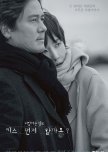
A three-dimensional, grown-up love story, sensitively told and spiritedly acted
When people have lived for more than four decades, they are usually disillusioned in many ways. Hope for romance and love has given way to various, quite specific experiences... and these are inevitably paved with disappointment and suffering, too. However, it´s not necessarily too late for a new love. It might be different, though. More grounded. Honest. Upright. Less games. Sincere closeness and warmth become more important than romantic squabble. The time ahead is finite. And you no longer expect a fairy tale full of magic, but rather wish for true moments, a safe place to catch your breath and recharge your batteries. Reliability. Trust and emotional intimacy.The protagonists in "Should we Kiss First" have all been through life for some time. The two main characters have had children and lost them again, have been married and divorced, lived more or less honest but empty lives. SHE has been a stewardess for 20 years and suffers from insomnia. HE is a co-founder of an advertising agency and has cancer. Neither of them want to be alone. Neither of them want a relationship. Hm. Difficult. Their best friends each want to pair them off ... and at last are successful. However - being in makjang KDrama Land - the past of the protagonists gets involved in the present and triggers a lot of turbulence.
"Should we Kiss First" focuses on two adults who (re)experience love in a way they never expected. Love is not primarily supple, sexy and redeeming, but presents itself as irrational, brittle, stubborn and complex. As such, it demands one thing unconditionally: complete surrender to this feeling, which remains in spite of adversities, yet does not solve any problems. However gives the necessary strength to face them.
Does this power come from the love you experience from someone? Or from the love that you give yourself? The beauty of this KDrama is placing the emphasis on the fact that it is your own radiance which makes a difference. The love we open up to and give in to makes the difference how we experience life, or what options we recognize and choose... It's about giving in to your feelings, letting them be (even if you rather not put up with it) and trusting them.
The story is told in different nuances - sometimes humorous, sometimes profound, sometimes tender, sometimes playful, sometimes harsh, even fists are flying at times. Enjoying the moment to the fullest and the pure love of life have just as much space as the desolate moments of emptiness, embarrassment, destructive anger and listless lethargy. The dialogues are carefully chosen down to the last detail. And then there are the subplots, that round the story off.
A three-dimensional, grown-up love story. Yes, once again a story about love, but not cheesy. Instead, the story is sensitively told, spiritedly acted and filled with a love for detail. On top of that, a story full of sometimes subtle, sometimes explicit wisdom. A KDrama that doesn't sugarcoat anything, yet feeds you with a satisfying sigh.
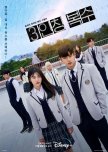
A sad & highly topical social issue, dealt with in a palpable, exciting, sensitive, touching way
"Revenge of Others" is set in the world of South Korean high school students. No teenage squabble, but a story with substance and depth. With flexibly intertwined subplots, it offers a sad and highly topical social issue, dealing with it in a palpable, exciting, sensitive and touching way. Should you watch? Yes!"Revenge of Others" (like "Weak Hero Class 1" in 2022) deals with the topic of mobbing /bullying. In Korean, the slang term 'wang-ta' is quite common, and for me helped for a better understanding of the special and increasingly dramatic situation surrounding bullying at South Korean schools, which can even lead to suicide. (See side note below.)
This KDrama spotlights a Seoul high school where there appears to have happened a suicide. Everyone is shocked. Some know more. But if the sister of the victim, who has been living separated from her brother for many years, would not try to get to the bottom of it, then this would be a sad case of suicide without a murmur. It probably happens all too often in one way or another that fundamental questions in an apparently obvious case are left unanswered. However, this KDrama bravely wants to get to the bottom of the matter and its circumstances - here in the person of Ok Chang-mi.
As so often in the context of bullying, the adults don't look too good and don´t offer anything promising for making a difference regarding those fatal peer group dynamics. They are left outside. The high school students have to find a way for themselves to get along with their classmates - if possible highly adjusted underneath the social wang-ta radar (or at least with a solid network).
"Revenge of Others" is a production for the international streaming market. Things rarely get too brutal at Disney, though. The amount of violence is therefore limited (compared to e.g. "Weak Hero Class 1") and instead there is more room for relationship dynamics in side plots, causal connections and shades of gray.
By the way, in connection with "Revenge of Others" there is also a whole series of promising actors to admire!
---------------------------------
SIDE NOTE: --- Wang-ta in South Korea ----
With Wang-ta, the focus is not so much on the 'act' - bullying or harassment - but rather on the entire context of active and violent marginalizatin of an outsider. For example, it can be used as a swear word for the excluded person or as a description of the bullying activity. In a collectivist society like South Korea, group affiliation and group interest is paramount. This applies not only to the family, but also to the school class and also to the peer groups within the class or school. Unfortunately, this value system results in a fatal situation when it comes to actual bullying: bringing shame on the group, the outsiders are at the bottom of the social hierarchy. Whether it's because of school performance, family background, origin, belonging to an undesirable minority, looks, dress, a handicap, an unusual belief or an abnormal inclination: Wang-ta is a label that no one wants to personally be confronted with. Everyone agrees on that. At the same time, Wang-ta becomes a free pass for more or less cruel mobbing/bullying. Worryingly, perpetrators, victims, and witnesses alike accept the premise: all forms of bullying, almost anything related to Wang-ta, is permissible. The perpetrators take advantage of this, the victims immediately feel even more inferior in terms of their shortcomings (of whatever kind), and the bystanders silently nod the action as justified - or even actively join in. There is no moral barrier against this specifically cultural, collectivist background. It can even get out of hand. There are cases where the entire school has ended up participating in one person's wang-ta. From a Western, individualistic point of view, this is perhaps difficult to understand, because apart from group norms there are other socially recognized ethical principles that could be introduced as a serious confrontation of wang-ta behavior. Unfortunately, this hardly is the case at South Korean schools with a collectivistic social culture.
--------------------------------------
SIDE NOTE: In connection with this KDRama also an additional side note on
--- Punishment vs. Suffering of Victims ---
The psychological trauma for the bullying victims are with long-lasting effect. Unfortunately, the punishment of perpetrators is not proportionate to this day. Punishment is rather harmless - it may be annoying to the perpetrators, but not really a deterrent. Far too much must have happened before expulsion actually occurs. A corresponding entry in the files is actually completely deleted two years after graduation. In fact, nothing is left behind on the perpetrators' side. On the other hand, from the memory of the victims the experience cannot be so easily erased ...
The documented cases of wang-ta in South Korean schools (yet many are not officially reported) have steadily increased over the past three decades. According to a study by the Ministry of Education, between 2013 and 2017 the cases have more than doubled from 11.749 to 31.130. There are also increasing numbers of victims who saw suicide as their only way out. It has now been empirically documented that South Korean pupils with a personal Wang-ta experience are more suicidal than those without. Suicide is by far the most common cause of death among 10 to 24 year olds. Almost 1.000 young people took their own lives in 2020 alone.
In respect of the lack of serious consequences for the perpetrators in Wang-ta cases and their comparatively unsatisfactory punishment, a kind of vigilante justice has been established among the families of the victims concerned. "Revenge of Others" picks up on this (similar to "Angry Mom" a few years earlier) as a theme in variation.
In fact, facing a lack of serious alternative punitive measures it seems not uncommon for relatives of victims to pay someone of the same school age to take care of an appropriate 'punishment' - i.e. 'undercover'. Clearing up violence with violence is of course a dubious solution. Sadly, this seems to be the only way to show real consequences to the perpetrators and give the victims at least minimum size satisfaction. ...Although it should be probably considered more of a satisfaction for the relatives of the victims, because the victims themselves still have to deal with their psychological wounds and scars for a long time. Revenge does not undo the painful experience of mentally and physically harassing exclusion...
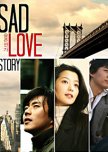
Yes, it is sentimental. Yes, it is emotionally intense. Yes it is a Love Story - KDrama style.
"Sad Love Story" marks the beginning of the wave of success that over the past two decades has carried KDrama far across the South Korean peninsula. It has mastered the art of telling drama in a way that grips the heart and doesn't let go until the end - even if some aspects are predictable and there are clichés: the journey is the goal. One is always close to the emotions of the protagonists and they move unrestrainedly up and down. More drama is always possible. Yes, it is sentimental. Yes, it intends to be emotionally intense. Yes it is a Love Story - KDrama style.Actually, "Sad Love Story" is a love story through and through. Touching in all possible directions. Obviously 'sad' too. The story navigates between 'blissful' and 'desperate' within a fascinating field of tension and relentlessly takes the audience along. At the same time, "Sad Love Story" is a study of how often supposedly small interventions (actually more like assaults) - sometimes nasty and selfishly motivated, sometimes noble and well-meaning - can mercilessly plunge one (or more) lives into misfortune. The level of pain and suffering people can endure is amazing (and encouraging). This story is fictional, but reality is full of it in all sorts of variations.
Among other things, in this KDrama one is confronted with the USA - from a South Korean perspective. That's quite interesting, too. "Sad Love Story" thus points towards a reality that people in the 21st century might be happy to forget. South Koreans and Germans probably have this in common: the presence of foreign military forces. Since the Korean War of 1950-1953, the USA, as an ally, has operated various military bases in South Korea to help defend the country in the event of a military threat from North Korea. After Japan and Germany, the United States is showing its strongest military presence with its troops stationed in South Korea. Camp Humphreys south of Seoul is the largest unit with US military personnel stationed overseas. There are several more, i.e. including Army Garrison Yongsan in Seoul, Camp Walker in Daegu, United States Navy Fleet Activities Chinhae near Busan, and two Air Force stations in Osan and Gunsan south of Seoul.
------------------ SIDE NOTE: --- "American Towns" ---
"Sad Love Story" puts the "America Town" (or "A-Town") of Gunsan in the focus of the story. The Air Force Station on the west coast is rather small, but the stationing of the US soldiers ensured that an entertainment culture geared to their specific needs was established. "American Town" in Gunsan is not the only one of its kind. They have thrived around all of these US bases since the 1950s. For example, today's hip Itaewon with its famous red-light district "Hooker Hill" in Seoul dates back to this "A-Town" culture, which specialized in entertaining the American GIs. Bars, restaurants, shops, services. Particularly lucrative: brothels... The KDrama also makes reference to the GI entertainment culture in the larger cities as it progresses. And finally also to the somewhat 'other' reality behind the dazzling GI heroes in uniform, which sometimes appears quite sobering when back 'at home' in the USA...
The "A-Town" was designated as an independent area with special "tourist facilities". It is a contractually regulated fringe zone, coordinated between the USA and South Korea - an intermediate world with its own laws. In spatial terms, too, it is located between the actual residential area (e.g. the city of Gunsan) and the air base. It consists of a cluster of bars, shops, restaurants and a few hundred small apartment buildings, each consisting of one room, kitchenette and toilet. Here lived the prostitutes, barmaids, singers...
----------------------------------------------------
In "Sad Love Story", the protagonist's mother runs a bar in "American Town", that optionally offers additional comforting services, while the protagonist's aunt is a singer in this bar. Together with other employees, they live in the immediate vicinity of each other and form a kind of community, so to speak. The "A-Town" forms the setting in which most of the characters in this KDrama grow up or live. It's a world of its own. It is at the same time an existential basis, a shackle, a flaw and the driving force to wanting to break out. It is also the place of greatest happiness and source of inspiration for the two protagonists.
Anyone watching this series should have a handkerchief or two handy. The Wheel of Fortune challengingly turns for two souls who are deeply connected in love and who mutually encourage each other to actually be true to who they are. Mercilessly the wheel turns and turns and turns... To a certain extent, actor Kwon Sang-woo ties directly into his role in "Stairway to Heaven", while actress Kim Hee-sun shines as a stoically frugal blind person who due to her disability is often helplessly at the mercy of her environment.
I admint, I forgot quite a few KDramas relatively quickly after watching. However, there are some, that due to their emotional intensity, today are still as present as if I had just seen them. These KDramas create a state of being that one doesn't really want to leave - also (or precisely because) it consistently remains in this characteristic conflict between weal and woe. And I am sure, "Sad Love Story" will also be one of those memorable ones. The soundtrack skillfully catches this situation and never tires of throwing in its leitmotifs as a pacemaker. "Sad Love Story" may be 'old', also outdated in format and style, but at the same time the series is timeless. In its mercilessly stirring mixture of love story and makjang it´s one of several masterpieces of the early 2000s that offer Love-Story-telling in its unique KDrama way. It is not about ´watching´ a story from the outside, but letting it in and empathizing. However, you have to like this style. Also the repeated holding on to the emotional key scenes. E.g. the topic itself has long since been told, but so that it also emotionally reaches the audience, the shot stays a little longer...
It should also be noted that the mixing with the US military and the scenes in the USA required a comparatively active participation of ´American´ actors. Those who also speak Korean (for an uncomplicated, smooth organization on the set) are probably rather rare. The talented ones among those obviously even more so. In this respect, the production inevitably breaks down a bit in terms of its acting quality.
And last but not least: In general, the early KWave productions are still more soap-like-style and not comparable to those Netflix (co-)productions over the past 6 years. Being spoiled by recent production quality, one can certainly linger on one or the other detail, as well as on the abundance of episodes (i.e. more and more and even more maybe unnecessary emotional loopings for the actual story to be told). If you have a problem with that, I would not recommend this KDrama.
"Sad Love Story" is for lovers of mercilessly intense emotional, slow-paced Makjang Love-Stories with plenty of heartache and a clenched fist in the pocket (and sometimes in the face).
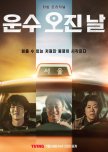
Absorbing & intense 500 minute road movie. A taxi ride to a soul´s nowhere. Brilliant from A-Z.
For me, “A Bloody Lucky Day” is one of the KDrama highlights of 2023.It is a psychological thriller. Without makeup. Set in a fairly grounded, solid, authentic everyday world, which gets challenged by a maniac´s incredible psychological logic. Stirring. Brilliant from A-Z.
However, everything revolves around the abysmal work of a psychopath. Accordingly, things get mercilessly brutal at times. The cumbersome police don't come off so well. Common sense, on the other hand, does... when it is in fact emotionally cornered to the extreme, so that it can no longer help but function at full speed, without distraction whatsoever.
One-pointed concentration, already having lost too much, getting your teeth into it and being ready to go to extremes – could that be the recipe to counteract the psychopathic 'monster'? Could... Maybe... Or not... Or is it?
“A Bloody Lucky Day” could be considered an absorbing ca. 500 minutes long road movie - a taxi ride to a soul´s nowhere. For the poor taxi driver a rather involuntary participant observation study on a psychopathic killer...
Emotionally highly explosive. Intense. Acting is first league. As a I mentioned earlier, a brilliant production from A to Z.

The plot has enormous potential, yet more bite and sting really wouldn't have hurt.
The share of Makjang in South Korea's series productions seems to decrease noticeably. After 3 seasons of "The Penthouse" in 2021, taking the evil within the "´War of Life´ to the extreme, it might have been somewhat exhausted? Thus, "Curtain Call" may be a noticeably 'softened' Makjang series (if at all). In this manner however, the KDrama represents a social zeitgeist that should not be underestimated: the desire for reconciliation. Reconciliation with the North. Reconciliation between generations, between the past and today. Reconciliation between duty and dream. The search, the longing, the need for South Korean society to balance itself on a new level - finding peace. To me, that's what "Curtain Call" stands for.As so often, the focus is on the rich and beautiful. In this family clan, too, the third generation could disassemble itself in the fight for the golden spoon. But somehow things are a bit different here than otherwise in KDrama Orbit.
The head of the family is (quite progressively) a woman. Matriarchy instead of patriarchy, that makes a difference. While she probably represents business acumen and a strong leadership style, for all the respect she receives, she has NOT sacrificed her heart for her grandchildren and employees on the track. Also: For once, she (at least she) does NOT embody the incarnation of disparaging arrogance. She is NOT someone who mercilessly pursues her own interests without regard for human losses. In the contrary, there is a healthy dose of humility, because even in old age she is still close to the very simple roots of her origins. This is also because her homeland is in what is now North Korea. She remains aware of the painful separation throughout her successful life. No amount of money can turn back time or realign the political structures. Like that, she embodies a vicarious pain shared by many family histories across the country. And so an emotional bridge is practically built to the audience - ´halmoni´ gets some sympathy.
The plot has actually enormous potential: the grandson from North Korea, for whom the now old and terminally ill chair(wo)man longs in her last remaining weeks and months, was actually found. However, his personality seemingly doesn't lend itself to a peaceful happy ending - and so an actor who is versed in the North Korean dialect is introduced into the family as a fake grandson instead. He does his job so well that he ends up doubting his own identity...
"Curtain Call" manages to play out some of its punchlines in an emotional sensitive way. Nevertheless, the story remains more harmless than necessary and the potential isn´t realized. The KDrama doesn't take its chances, instead prefers to choose warm colors and soft images. All in all, "Curtain Call" might find its own pitch in the KDrama orbit, yet it keeps a low profile along the way and unfortunately does not take the next step. It rather remains kind-hearted and thus gambles away a dramaturgical chance. In my opinion, more STING really wouldn't have hurt. Too bad.
Nevertheless: "Curtain Call" is nice to watch. The cast is top notch. In places razor-sharp and at the same time pointedly funny, the KDrama also operates (especially against the background of the North-South dynamic) in a good mood with small socio-critical side swipes here, there and over there as well. The dialogues exploit this potential with relish. The bottom line is that "Curtain Call" is probably worth seeing if you DON´T feel like too much excitement, revenge, action, thriller, legal affairs or romance.
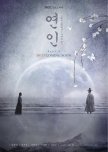
Another milestone of epic love story & a new aspirant for the hall of fame of historical KDramas
Now that another 11 episodes of the second season of “My Dearest” have come to an end, I have a couple of additional thoughts, that I would like to add to season 1.First.
In my opinion, the mission (I am here referring to the side note of my review for season 1) was a complete success in terms of the haunting dramaturgical interlinking of personal fates, love stories and a historical context, whose traumatic shadows for the national self-image extend to this day. Therefore I consider “My Dearest” as definitely belonging to the hall of fame of historical KDramas. And as a milestone of epic love stories, too.
So, on the one hand, there is the never-ending, tragic roller coaster of this fateful lovers... at times you may even become impatient that this (hopefully!) has to come to a happy ending soon, shouldn´t it? On the other hand, it is precisely because of those two significantly insignificant contemporaries and their personal context that we are cleverly torn ever deeper into the actual historical and political framework of that time. Whether we like it or not. Basically, we are of course primarily concerned with the touching dynamic between the two :-) but, nevertheless, we inevitably get closer to the dilemmas of the people, their problematic king and the political framework of that historical chapter, too... Thus, the emotional intensity of the love story kind of also serves as the cream topping for an audience, who is going all the way through this humiliating (preferably repressed) time for Joseon.
This brings me to the second:
I was positively surprised, how Confucian moral values (based on ruling authority, especially morality and loyalty) are openly pilloried in this production. Actually, the MBC KDrama production “My Dearest” from 2023 takes a pleasingly liberal stand, when it comes to a conclusion. Officially, in the narrative of the story, authoritarian values are upheld, but for the audience, this supposedly unerring path to ´order´ and ´harmony´ is clearly revealed to have failed.
It is said that the fish rots from the head down. Eventually, when it comes to such a stench, the noble, ethical-political teaching of Confucius must fail, too, if authority (embodied by the king, the teacher or the father) is weak, sick and delusional. Loyalty to a delusional king or an almost fanatical adherence to principles obviously borders on stupidity. Thus, it doesn't accomplish anything. On the contrary. Dramaturgically speaking, “My Dearest”´ haunting dynamic is driven by exactly this officially ethically legitimated, but then in fact again personally motivated 'stupidity' of some, who call themselves scholars or nobles. Practically speaking, it is about stranded traditional Confucian values… and therefore, as far as Joseon at that time is concerned, highly self-critical, too. (E.g. it is neither ONLY the Qing, to be blamed, nor ONLY the Joseon king…)
P.S.:
And as a third:
In my opinion, Ahn Eun-jin in the role of Gil-chae has really catapulted herself into a new league of acting over the course of the series - with her increasing presence, depth, authenticity and overall growing charisma. Respect! I'm definitely looking forward to further productions with her as female lead...
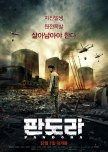
A disaster movie, yet using emotional + vivid suggestive power in the tradition of anti-war-movies
"Pandora" is a disaster movie.I don't really consider myself a fan of this genre, which focuses on mass panic and adrenaline.
However, I consider this KMovie particularly valuable.
In this case I think the makers have succeeded in doing something similar to what anti-war movies try to achieve: deterrence by vividly conveying the threatening horror. In respect to the scenario of a nuclear catastrophe the movie applies emotional and vivid suggestive power, at the same time making people think and possibly question the sense and usefulness of highly dangerous nuclear power plants.
In view of the consecutive radical change of South Korea's nuclear policy six months after "Pandora" was released, one could say: the project was worth it. (It would probably be too daring to talk about causality, but it could be considered a noticeable correlation...)
The 2016 KMovie picks up on the 2011 Fukushima nuclear disaster and, against this background, develops a story that is comparable by South Korean standards. South Korea is the country with the highest population density in the immediate vicinity of its nuclear power plants. However, due to its insular position, a realistic evacuation plan in the event of a disaster is a major problem. With the movie "Pandora" the lid of the legendary box is shaken. In this case, a nuclear power plant on the East Coast suffers earthquake damage and radiation leaks, similar to Fukushima 5 years earlier. The film fictionally exercises the processes in the event of such a catastrophe (or a comparable one) and comes full circle with a deliberately touching scene in which Kim Nam-gil makes an emphatic plea against nuclear power in his usual impressively passionate way.
Regarding such critically oriented material, the production obviously had difficulties with its financing - in South Korea the lobby of the nuclear industry is as powerful as anywhere else. Nevertheless, the ambitious project could be realized through crowdfunding.
------------------------ SIDE NOTE: --- Sobering facts/outlook on nuclear power plants in South Korea ---
"Pandora" was released in December 2016.
In early summer 2017, as one of the existing South Korean nuclear reactors was actually scheduled to be shut down, President Moon Jae-in announced that the country's nuclear-focused energy policy would be stopped and that the country would instead steer towards a nuclear-free era. Accordingly, plans to build new reactors or extend the life of existing ones have been abandoned. A sign of hope?
However, by the autumn of the same year already, the government's political commitment was no longer valid. The nuclear lobby has actually been able to exert such pressure (the President's faction not having a majority in Parliament....) and prevail that new power plants were going to be built again.
South Korea's nuclear companies make a lot of money by exporting their self-developed reactors. The companies want reference projects in their own country... it is as simple as that...
As far as the people are concerned: According to a survey by the polling institute Realmeter in 2018, 61 percent of adult South Koreans still firmly support their president’s original nuclear phase-out course. Another 10 percent tend to do so. Yet, the lobby as so often has more to say...
... To date, South Korea covers a third of its electricity needs with 24 nuclear reactors.
... There are always earthquakes on the peninsula...
------------------------
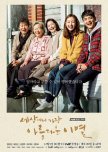
Very humane. Tangible. Touching, yet not maudlin. Sad, yes. But unpretentiously radiating, too.
"The Most Beautiful Goodbye" is a KDrama that consists of only 4 episodes. However, they have it all and are completely sufficient to leave their mark in the sand. We are confronted with the limits of healthcare system - when medicine no longer has a solution to offer and people are left with themselves and what they are: mortal beings. In ruthless directness, the viewers are confronted with what many people (all over the world) might at some point face in one way or another.The family here is not particularly rich and not particularly poor. The individual protagonists are not particularly successful and have not particularly failed. Everyone lives their (South Korean) life as best they can. Not very happy and not very unhappy. With a tendency not to not be so happy. But they are actually not really unhappy either. In fact, everything could be quite nice, but everyone is just too busy with themselves. The WE becomes self-evident and rather annoying... until the day the finitude of being was knocking on the door...
However, hello-wake-up does not imply everyone starts reinventing themselves, overcoming their weaknesses and becoming better people. It does, however, force them to reflect on what they have and what they have forgotten (to love) (consciously) despite everything being taken for granted. In stumbling everyone is searching for an expression of their own feelings. At least they try to be a little bit more alert about what is going on in their life.
Very humane. Tangible. Touching, yet not maudlin. Pretty close to life. People are clumsy, speechless and helpless, as akward as it gets. It is a lesson in compassion, triggering your own experiences, when it comes to similarily unprepared being confronted with any form of (unwanted as it is) final farewell.
Sad, yes. But unpretentiously radiating, too.
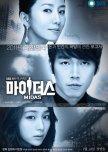
Balancing genius, intuition & healthy grounding in an elite jungle of an addictive financial world
How far can you go? The focus of these KDramas is greed for BIG money, which has long since lost any reasonable connection to life and people. It's about stock deals by the super-rich, insider trading, short selling, mergers and acquisitions.Hiding behind the title "Midas" is the legendary story of the ancient King Midas. It is said that as a child, ants would put grains of wheat in his mouth while he was sleeping. He was later granted a wish by Dionysus, wishing that everything he touched would turn to gold. The consequences though were life-threatening, because actually everything he came into contact with turned to gold, including food and drinks... The story of the KDrama operates both with the dictum "to have a golden hand", which is inspired by this legend, and with the psychoanalytic concept "Midas complex", which has proven itself in connection with pathological greed.
The protagonists in "Midas" have an offensive urge, almost addictive, to make even more profit with daring investment strategies, sometimes risking to lose the ground under their feet and maneuver themself into existential situations. This KDrama is about the challenge of balancing genius, intuition and a healthy grounding within the elite jungle of an addictive financial world. Thrilling story, complex character studies and emotional rollercoaster are guaranteed. In this world where money, intelligence and high speed set the tone, the intuitive feeling for the right timing prevails. "Midas" broadens the horizon from the (rather usual) Jaebeol family intrigues and inheritance disputes, which also have their place here, to - without regard to losses - partly illegal machinations in the financial world.
"Midas" is sketching a world of high risk and high numbers - abstract, fast pace, fashionable, cold. Yet it is an emotionally intense in-depth study about temptation, including space and time for morals. However, a spot here and there, where the warm and tender wind blows, is given, too. Some call it love...


 9
9 40
40 15
15

















